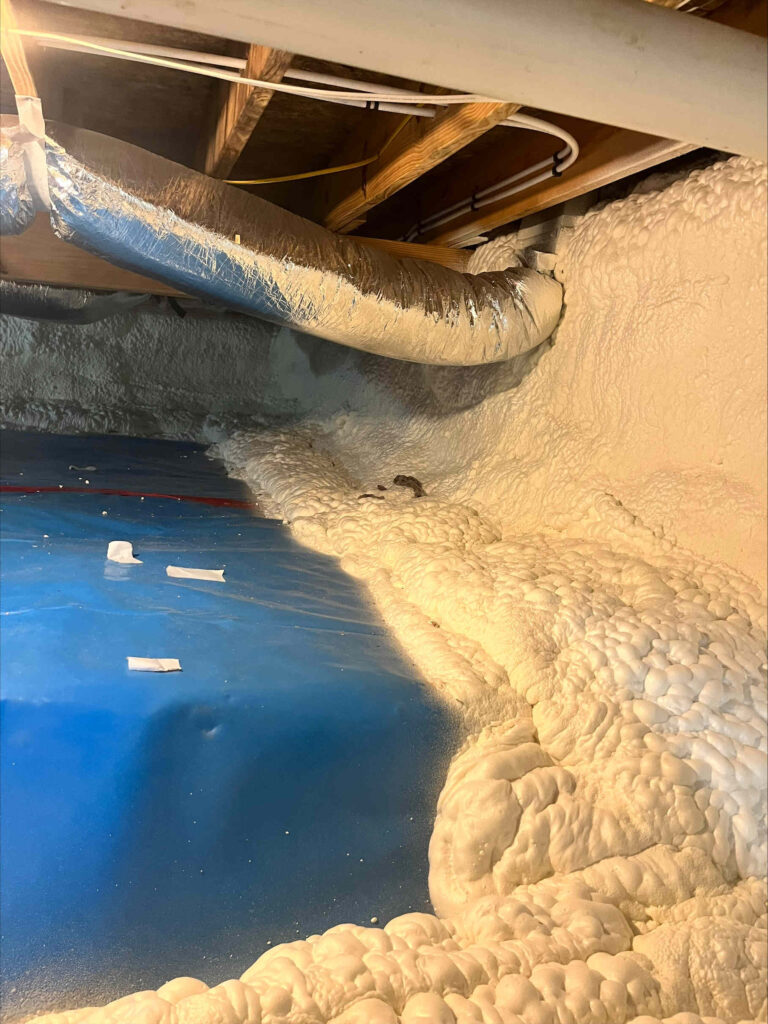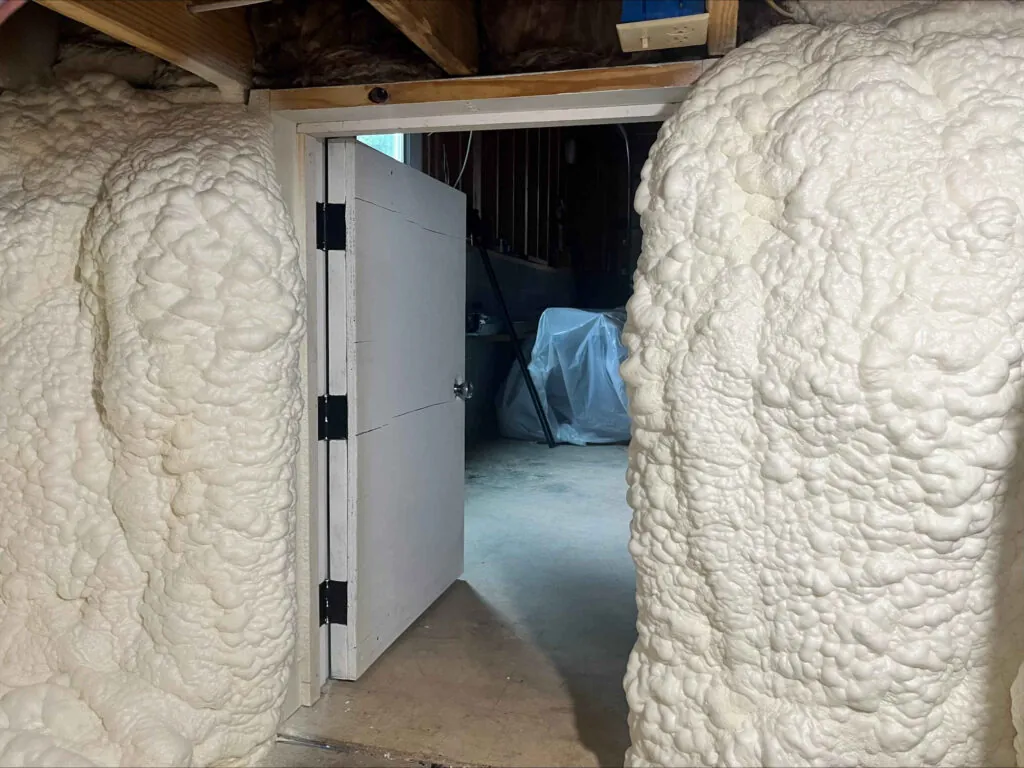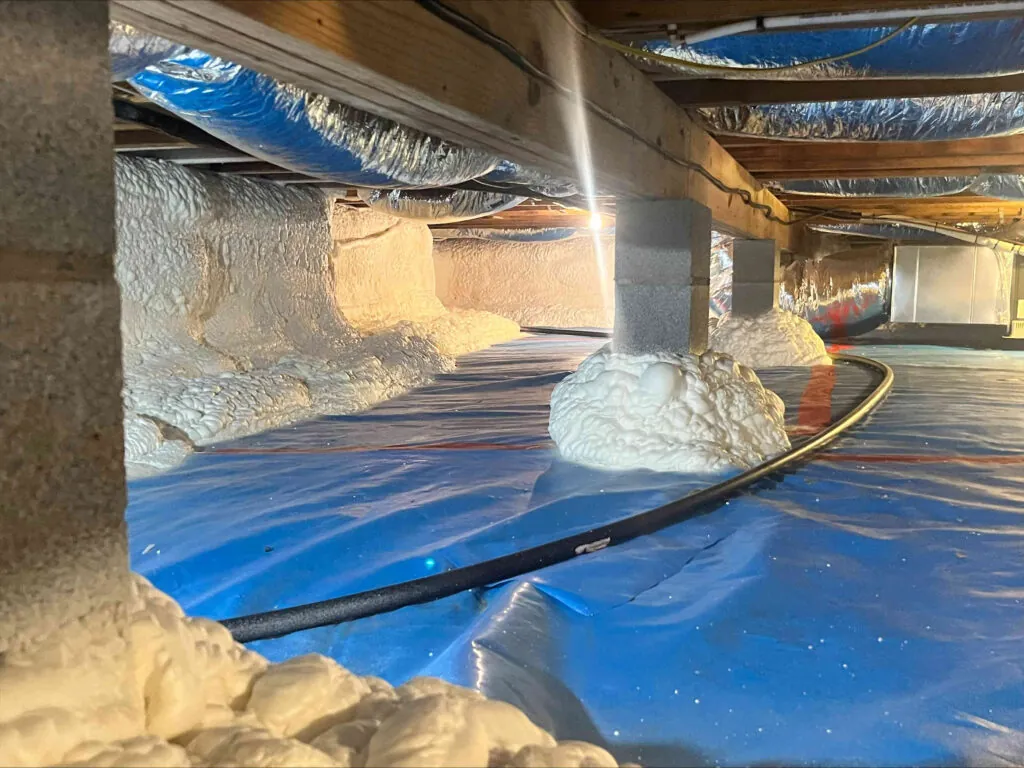We Are Lynchburg’s Crawl Space Insulation Experts
Crawl spaces are not thought of as important features of your property and are often overlooked in favor of other areas of your home. But if not properly addressed with crawl space insulation, they can create problems for the rest of your home and for your family.
Crawl spaces are susceptible to moisture and deterioration problems because of the humidity in soil which can cause them to become damp. This damp environment can be unhealthy, harbor mold, and create an ideal living space for pests. By properly insulating and conditioning your space, these problems can be reduced.
Toler Insulating offers crawl space insulation in Lynchburg where we help our customers understand the similarities and differences between crawl space insulation and crawl space encapsulation, and which is best for their home.
Non-Vented / Conditioned Crawl Space
A conditioned or non-vented crawl space is one that does not have any venting to the outside and typically has a supply vent from the heating and cooling system in place. Conditioned spaces do not have vents, or they have the vents removed and blocked. They contain a vapor barrier on the ground sealed to the exterior walls of the space, and sealed at all seams, encapsulating the crawl space, as well as insulation on the exterior walls and band—usually in the form of spray foam, vinyl backed fiberglass, or foam board insulation, creating a thermal barrier insulating the crawl space.
Conditioned, non-vented spaces have many advantages over their vented counterparts, such as an average 15% savings on heating and cooling costs, humidity controls that hinder the growth of mold and mildew, warmer floors in the winter, and better indoor air quality. Conditioned spaces can be designed and implemented at the time of construction or retrofitted into most existing homes that have a vented space.
Vented Crawl Space
Vented crawl spaces are very common in this area and often are either under-insulated or not insulated at all. While vented spaces can suffer from high humidity, mold, and mildew, encapsulating your vented crawl space will create a vapor barrier to minimize moisture and its effects, while adding insulation will create a thermal barrier to improve your home’s energy efficiency. At Toler Insulating we have the knowledge and expertise to help you minimize any negative effects of a vented crawl space, as well as increase the comfort and energy efficiency of your home. We make the crawl space encapsulation cost or crawl space insulation cost worth every penny.
Contact us today to learn more about crawl space insulation in Lynchburg and request a proposal for a free evaluation of your property. We look forward to discussing recommendations with you for the best insulation for crawl space projects, and why crawl space encapsulation and crawl space insulation are best for your home.
Crawl Space Insulation FAQs
- Q: What are the benefits of insulating my crawl space?
- A: There are many benefits to insulating and sealing your crawl space including increased home energy efficiency, lower energy costs, improved indoor air quality and comfort, and greater structural integrity of your home.
- Q: Which type of insulation is best for my crawl space?
- A: Closed-cell spray foam, vinyl backed fiberglass, and rigid foam board insulation are popular choices for providing effective moisture resistance and insulation to your crawl space.
- Q: How much does crawl space insulation cost?
- A: Crawl space insulation costs in Virginia vary depending on size, material, and labor.
- Q: How long does it take to insulate a crawl space?
- A: Although the time needed to insulate a crawl space can vary based on size and complexity, it typically takes a few days to complete the job.
- Q: What are the building codes for crawl space insulation in Virginia?
- A: Virginia’s building code requires a specific R-value for crawl space insulation based on our climate to allow for maximum energy efficiency.
- Q: Do I need to encapsulate my crawl space before insulating it?
- A: To create a sealed environment, maintain moisture control, and enhance your insulation’s effectiveness, it’s recommended that your crawl space be encapsulated before insulating it.
- Q: How can I tell if my crawl space is wet or damp?
- A: Signs of a wet or damp crawl space include water stains, mold, musty odors, damp surfaces, high humidity levels, visible water, or rot.
- Q: Does an encapsulated crawl space need insulation?
- A: Encapsulated crawl spaces benefit from insulation to enhance energy efficiency and comfort. It complements moisture control measures for optimal performance.
- Q: What are some common pests that can be found in crawl spaces?
- A: Common crawl space pests include termites, rodents, ants, spiders, and cockroaches–Yuck!
- Q: How can I prevent pests from entering my crawl space?
- A: Help keep creepy pests out of your crawl space with proper insulation, proper ventilation, sealed entry points, and regular inspections.
- Q: Are there any government incentives or rebates available for crawl space insulation in Virginia?
- A: Yes! There are several local and federal incentives for making home energy efficiency upgrades. Check out Virginia Energy Sense and Virginia Energy to see what incentives or rebates you may qualify for.
- Q: What are some other ways to improve the energy efficiency of my crawl space?
- A: Along with insulation and encapsulation, consider sealing air leaks (spray foam is perfect for this) and installing a high-efficiency dehumidifier to improve the energy efficiency of your crawl space.
- Q: Do I need a professional to insulate my crawl space?
- A: While DIY is possible, it’s always best to hire a professional for crawl space insulation to ensure proper installation, address potential issues, and maximize energy efficiency.
- Q: How can I find a qualified crawl space insulation contractor in Virginia?
- A: For a qualified insulation contractor in Virginia look no further than Toler Insulating. Our expert team has been meeting the insulation needs of homeowners and residential contractors in Central Virginia since 1994. Contact us today to learn more!


